Hands-On Review: Renogy 200Ah Lithium Iron Phosphate Battery
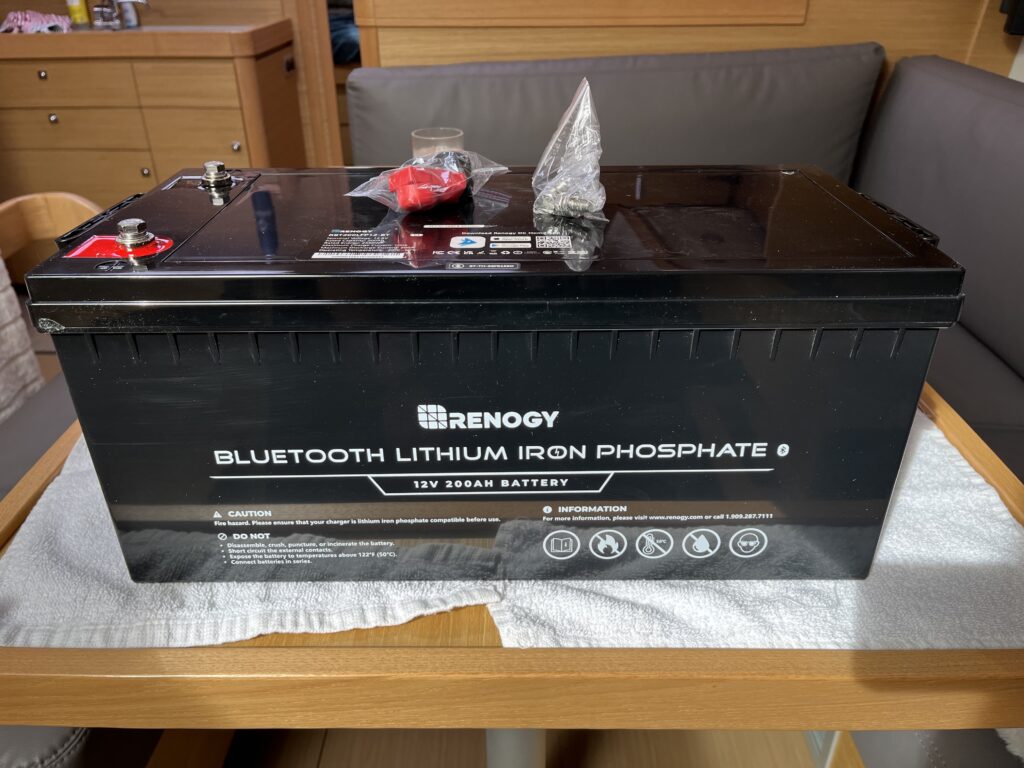
Outdoor adventures, whether it’s camping, van life, sailing, or off-grid travels, often require a reliable source of power to keep devices charged and essential equipment running smoothly. In recent years, lithium iron phosphate (LiFePO4) batteries have gained popularity due to their superior performance, longer lifespan, and enhanced safety features compared to traditional lead-acid batteries. Among the top contenders in this category is the Renogy 200Ah Lithium Iron Phosphate Battery. For our Renogy lithium battery review, we put the Renogy 200Ah LiFePo4 to the test.
We installed 2 Renogy 200Ah Lithium Iron Phosphate Batteries in our 46ft sailboat, Gratitude, and after 5 months of use, we’re giving you an inside look at how these batteries have performed. In this hands-on review, we’ll dive deep into the features and performance of the Renogy 200Ah Lithium Iron Phosphate Battery, examining its suitability for outdoor enthusiasts seeking a robust and versatile power solution.
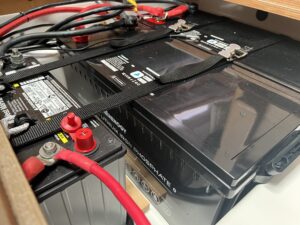
Throughout this Renogy lithium battery review, we’ll explore the design and build quality of the Renogy 200Ah Lithium Iron Phosphate Battery, assessing its durability and ease of use in demanding outdoor conditions. We’ll also take an in-depth look at its performance, examining its capacity, charging and discharging efficiency, and overall power output.
Additionally, we’ll delve into the battery management system (BMS) and safety features integrated into the Renogy battery – important features for peace of mind during your adventures. We’ll also evaluate the battery’s Bluetooth connectivity and let you know how monitoring your battery from your phone works in real-life.
To put these batteries through their paces, we’ve had them running our sailboat’s main 12V power system with a number of power-hungry electronics. Now that we’ve spent some time with these batteries, we can share with you how they’ve worked for us and help you decide if they are right for your needs.
The Verdict
4.5 out of 5 Stars
We LOVE our Renogy 200A LiFePO4 batteries! Their simple, but slick design cleaned up our battery compartment. They have performed much better than our previous lead-acid batteries and with the increased depth of discharge, give us more usable power overall. We are obsessed with connecting to the batteries via Bluetooth to see exactly what’s happening on each battery. We love them so much that we’re already working on adding them to our Overland Trailer. Our only hiccup with these batteries is that we have experienced some misreporting of the capacity status using the DC Home app.
Buy Now at Renogy’s Website
12V 200Ah Lithium Iron Phosphate Battery w/ Bluetooth
Overview of the Renogy 200Ah Lithium Iron Phosphate Battery
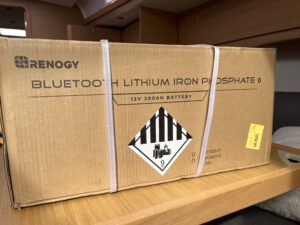
Renogy has established itself as a serious brand in the off-grid power space, specializing in solar panels, inverters, and batteries. With a focus on innovation and reliability at affordable prices, Renogy has gained the trust of outdoor enthusiasts and off-grid adventurers worldwide.
The Renogy 200Ah Lithium Iron Phosphate Battery is yet another Renogy product that shows their commitment to delivering high-quality off-grid power solutions. In this battery, Renogy has packed 200Ah of LiFePO4 storage with a battery management system (BMS) and Bluetooth built-in. Its impressive capacity of 200Ah provides ample power for extended periods, reducing the need for frequent recharging. When paired with solar panels, the time you could spend off the grid is limitless.
The Renogy 200Ah Lithium Iron Phosphate Battery packs a range of features that make it an appealing choice for RV, marine, van, and off-grid applications. The lithium iron phosphate (LiFePO4) chemistry provides several advantages, including a longer lifespan, faster charging, and increased safety compared to lithium-ion battery technology.
The battery’s compact and lightweight design makes it easy to transport and install in various setups, whether it’s installed in an RV, van, camper, boat, or an off-grid cabin. Its dimensions and form factor have been optimized for space efficiency while maintaining robustness and durability.
The feature that sets the Renogy 200Ah apart from other similar batteries is its baked-in Bluetooth technology. Using Renogy’s DC Home app (free), you can monitor your Renogy battery in real time. Being able to know exactly what is happening to your battery at any moment helps troubleshoot issues with your electrical system and gives you peace of mind when it’s functioning smoothly.
By familiarizing ourselves with the key features, specifications, and market positioning of the Renogy 200Ah Lithium Iron Phosphate Battery, we can proceed to examine its design, build quality, and performance in subsequent sections. Join us as we delve deeper into the intricacies of this battery and discover what sets it apart from the rest.
Design and Build Quality
Physical design and dimensions
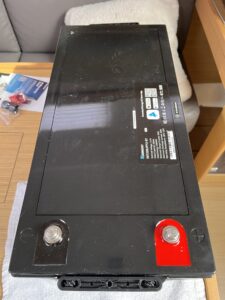
The design of a battery plays a crucial role in its usability and integration into various setups. The Renogy battery’s design aims to strike a balance between compactness and functionality. Renogy’s battery design is simple – a solid black plastic box with 2 posts. That’s it. We appreciate the lack of extra curves and cutouts that often cause batteries to collect gunk and make them difficult to clean. Not that you’ll be cleaning your batteries much, but it is nice to have a clean and tidy battery box when showing off your new LiFePO4 batteries.
The Renogy clocks in at 60.2 lbs, which is lighter than our old lead-acid batteries weighing 88 lbs each. The lighter weight made it a lot easier to install the Renogys than it was to remove the old batteries.
Specifications:
- length: 20.55″
- width: 9.45″
- height: 8.62″
- weight: 60.2 lbs
Durability is a crucial aspect when choosing a battery for off-grid adventures. Our batteries are strapped down deep in the bilge of our sailboat, so they won’t be taking a beating. In our case, the IP65 rating means our battery will be protected against everything it will see on our boat. IP65 means that it’s dustproof (the 6) and is protected against light water pressure (the 5).
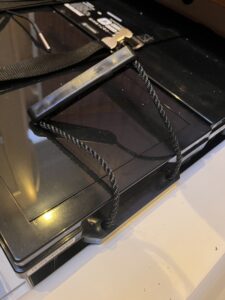
The Renogy is rated to charge in temperatures from 32-131°F and it’s rated to discharge in temps from -4-140°F – meaning you won’t be out of luck trying to use it to power your stuff in the desert heat or icy winter camping. This battery does not have a self-heating function like some competitors – so if you plan to use it in cold areas that routinely get below 32°F, you may want to choose a heated battery instead.
While lighter than many batteries of this capacity, the 60lb Renogy battery still isn’t really made for portable use. It’s heavy enough to demand a solid and permanent mounting location, but it’s light enough to lighten your vehicle load or to save your back a bit while installing. This battery has 2 solid handles at each end to make carrying these less awkward. The handles stow away into the side of the battery when not needed.
The terminals on this battery are insert terminals, also known as internal threads, and come with 2 M8 bolts. Out of the box, the Renogy 200Ah comes with 1″ M8 bolts installed, but longer 1.25″ bolts are also included.
Performance and Power Output
The most important aspect of a battery is its capacity and energy storage capabilities. With 200Ah of capacity, the Renogy can charge at up to 100A continuously – leading to ultra-fast charges if you have a beefy charger. Our batteries arrived at 80% capacity and our 30A charger had them full in under 3 hours.
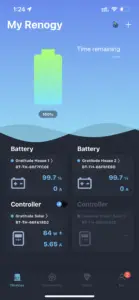
As far as output, this battery is rated to discharge continuously at up to 200A – valuable for applications that need high power available when required. The electric winches and anchor windlass on our boat require about 150A to operate under high loads and the Renogy 200Ah LiFePO4 handles them all without issue. These power-hungry devices typically only operate for short periods of time so the 200Ah capacity isn’t an issue, but the 200A continuous output is a necessity for them.
For most of the 5 months of our testing for this Renogy lithium battery review, they’ve been tasked with powering our day-to-day appliances on the boat. 2 12V refrigerators and a 12V freezer are the biggest power hogs in our system – with the two fridges consuming up to 140Ah of power per day when running nonstop. The Renogy 200Ah battery has handled these without issue, but with only the 400Ah of capacity these provide, it’s vital to our system that when we’re away from the dock, we’re conserving our power usage.
When we do need to lean on the batteries for a few days at sea, the 80% depth of discharge (DoD) of these batteries is a valuable spec. LiFePO4 batteries can be discharged up to 80% of their capacity without damaging the battery or shortening its life. Comparing this to the 50% recommended DoD of lead-acid batteries, LiFePO4 batteries give you more usable power than lead-acid batteries of the same capacity. For example, a 200Ah lead acid battery can only be discharged to 100Ah, but a 200Ah LiFePO4 battery can be discharged to 40Ah – giving you 60 additional amp hours for your system to use. That’s 30% more power!
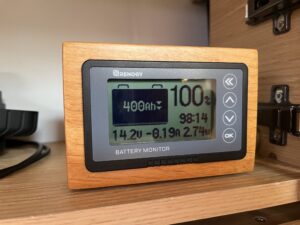
In our boat, we have a Renogy Battery Monitor installed that gives us another source of data to check the Bluetooth battery information against. As we powered up and powered down various devices, we were able to view the charging and discharging on each battery and verify that the numbers were consistent with the Renogy battery monitor. The best data the DC Home app gives when connected to the battery is current capacity. It’s important to know exactly where you’re battery capacity is at – especially on longer trips. The Bluetooth connectivity gives you the ability to check your capacity at any time. If you’re like us, you’ll check it every 10 minutes at first because having the data at your fingertips is just too cool to resist.
While we do not have the equipment or know how to properly test the capacity of our batteries, we can verify that the capacity reading via Bluetooth corresponds closely with our actual power usage.
As mentioned previously, the 100A maximum continuous charge rate on these batteries means they can be charged fast. We recommend a 60A or above charger to take full advantage of this feature and to be able to charge in record time.
The Renogy is rated to last 2000 cycles – meaning it can be charged and discharged (up to 80% DoD) 2000 times before losing performance or capacity. Compare this to the 500-1200 cycles you’ll get from lead-acid batteries and you’ll see how this Renogy battery will last a lot longer.
Since this is a 12-volt battery, it operates between 10-14.8 volts and prefers to be charged at 14.4 volts. When the battery reads higher than 14.8V or lower than 10 volts, it will trigger overvoltage or undervoltage warnings on the DC Home app.
Safety Features
Battery Management System
Encased somewhere inside the shiny black rectangle that is the Renogy 200Ah LiFePO4 battery is an advanced battery management system (BMS) that intelligently monitors the battery’s operating conditions and oversees its safe operations. The main benefit of a BMS is that it manages and redistributes temperature across the battery cells to maintain consistent temperatures to optimize battery performance. The BMS also aids in efficiently charging the battery to speed up charges and get the most out of your charging source. In Renogy’s case, the BMS also reports some of its data vis the DC Home app to give you even more data and control over your battery. Battery error messages, temperatures, and individual cell voltage can all be easily viewed in the DC Home app.
Auto-balancing Function
The Renogy 200Ah battery has an auto-balancing function that monitors and equalizes the voltage across the individual cells. When multiple Renogy batteries are connected in parallel, this function ensures all batteries will equally charge optimizing and speeding up the charging process.
Energy Saving Mode
When stored or not used, batteries lose their charge over time. Renogy has given their LiFePO4 batteries an energy-saving mode which it switches to if not charged or discharged for 24 hours. When in this mode, the battery will only lose 3% per month – meaning you’ll have more power available when you’re ready to put it back into use.
Bluetooth Connectivity
The Renogy 200Ah Lithium Iron Phosphate battery includes Bluetooth connectivity allowing you to monitor the current status of your battery via Renogy’s DC Home app on a smartphone or tablet.
in our Renogy lithium battery review, we were able to boot up the Renogy DC Home app on our iPhone and connect to our batteries easily. The DC Home app shows the following battery data
-
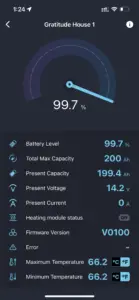
The battery data available via the DC Home app. Battery Level (percentage)
- Total Max Capacity (in Ah)
- Present Capacity (in Ah)
- Present Voltage (in V)
- Present Current (in A)
- Heating Module status (this battery not equipped)
- Firmware Version
- Error (messages)
- Maximum Temperature
- Minimum Temperature
- Cell Voltage
Bluetooth on this battery works really well. We had no problem connecting our batteries once installed. After downloading the DC Home app and opening it, our new batteries were found and we could add them to the app. Once added, the battery (or batteries) in our case show up each time the DC Home app is opened.
Our only real gripe with the DC Home app is that the added devices drop the connection each time you browse away from the app, forcing you to refresh the devices once you go back to the DC Home app. While we wish the Bluetooth connection would remain even when checking our messages or emails for a minute, we assume that Renogy designed this Bluetooth functionality intentionally to save power on your devices and phone. It’s not that big of a deal – but can be frustrating constantly having to refresh the devices when observing battery data over time.
The only other issue we’ve experienced during our Renogy lithium battery review is that we once arrived to our boat after some time away to find our batteries reading around 50% battery level via the DC Home app. Our boat is constantly being charged via a 110V/30A charger and we were concerned to find that the batteries were at half capacity and seemingly not being charged. Checking the battery charger, we found it in floating (maintenance) mode even though our batteries needed a fuller “boost” charge to get to full capacity. After powering our battery charger on and off a few times, the battery capacities both changed to show a full charge at 100% battery level. Apparently, our batteries were being properly charged while we were away, but for some reason, the capacity was not reflecting the charging on the DC Home app. While this is less of a problem than our batteries actually being at 50%, this experience will leave us wondering if the battery level is correct each time we arrive back at our boat. Luckily, we can verify battery levels via the Renogy Battery Monitor if this problem occurs again.
All in all, having the Bluetooth functionality is worth some occasional bugs, and we’re hopeful that over time, Renogy will release new battery firmware to fix these types of issues. Using the DC Home app is generally a pleasant experience and we’re thankful to be able to monitor our Renogy batteries and other devices. We do wish we could view our data over the internet and not just when we’re near our Renogy devices. Renogy has recently released the Renogy One that locally connects to your devices via Bluetooth and then makes the data available anywhere over the internet.
Pros and Cons of the Renogy 200Ah LiFePO4 battery
Pros
- High capacity: The 200Ah capacity provides ample power for extended periods, reducing the need for frequent recharging.
- Long lifespan: The lithium iron phosphate chemistry offers a longer lifespan of 2000 cycles compared to other battery types, ensuring lasting reliability.
- Fast charging: The battery’s fast charging capability minimizes downtime and allows for more efficient power replenishment.
- Compact and lightweight: The battery’s compact design and lightweight nature make it easy to transport and install in various setups.
- Comprehensive safety features: The built-in Battery Management System (BMS) and additional safety features ensure safe operation and protection against potential hazards.
- Bluetooth connectivity: Via Bluetooth and the DC Home app, the battery offers convenient monitoring capabilities.
Cons
- Higher cost: Lithium iron phosphate batteries are generally more expensive upfront compared to traditional lead-acid batteries, though they offer long-term cost savings. The Renogy battery is less expensive than many similar LiFePO4 batteries.
- Weight: While the battery is designed to be compact and lightweight, it still has a significant weight due to its capacity, which may affect portability for some users.
Renogy Lithium Battery Review: Is It Worth It?
The Renogy 200Ah Lithium Iron Phosphate Battery is a solid option for those looking to upgrade their battery bank. While expensive, its longer lifespan and increased usable power due to a higher depth of discharge make it comparable to less expensive batteries in the long-term.
The Renogy 200Ah Lithium Iron Phosphate Battery has demonstrated several notable strengths. Its high capacity provides ample power for extended periods, while the long lifespan ensures reliable performance over time. The fast charging capability minimizes downtime, and the compact, lightweight design enhances portability. The battery’s comprehensive safety features, including the Battery Management System, Auto-balancing Function, and Energy Saving Mode offer peace of mind during operation. Moreover, the Bluetooth connectivity makes it a high-tech option that lets you keep track of where your battery is at from the palm of your hand.
We hope this review has been informative and helpful in your search for a reliable power solution. Whether you’re embarking on off-grid adventures or seeking a backup power source, the Renogy 200Ah Lithium Iron Phosphate Battery has proven to be a versatile, efficient, and affordable option. If you choose the Renogy 200Ah Lithium Iron Phosphate battery for your RV, van, boat, or off-grid cabin, we’re confident it will power your systems for years to come and that you’ll be glad you went with Renogy.
Have thoughts or questions about our Renogy lithium battery review? Let us know in the comments.
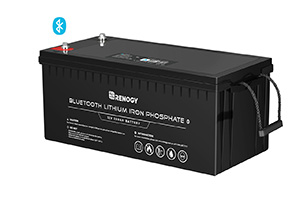
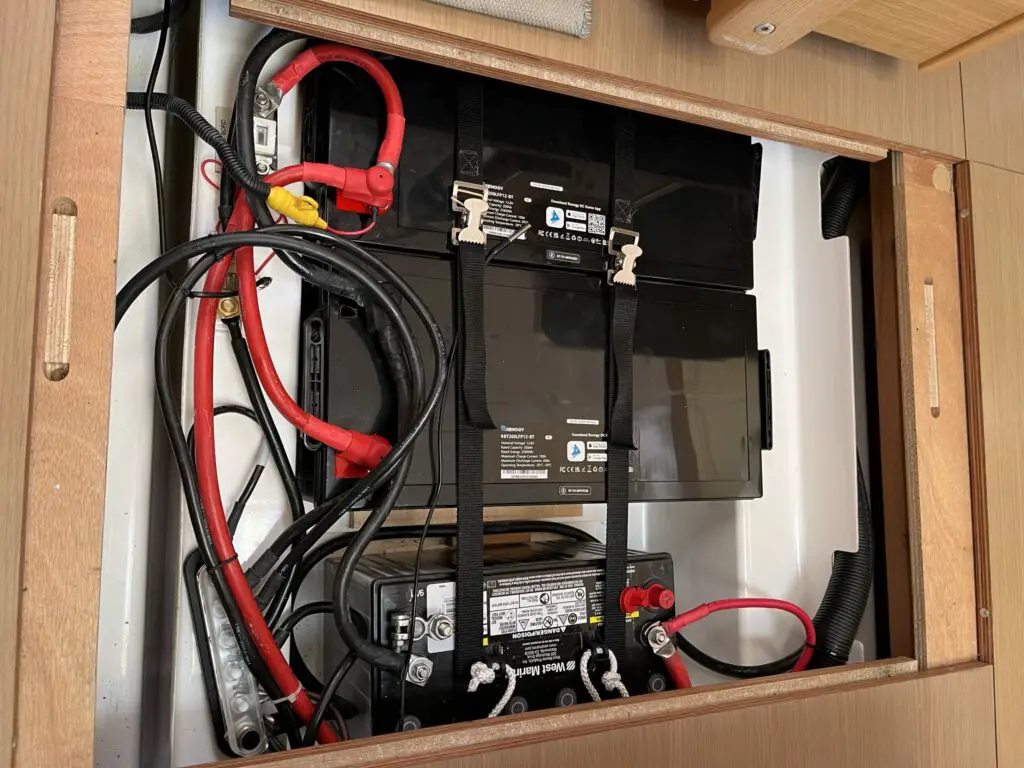
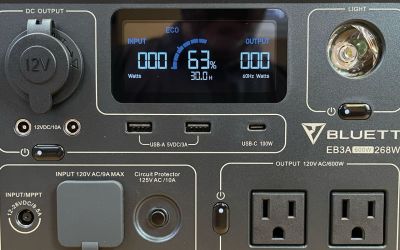
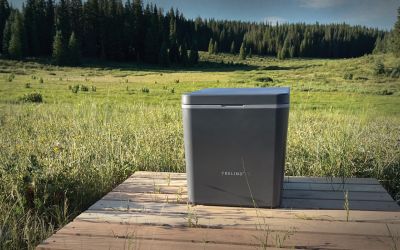


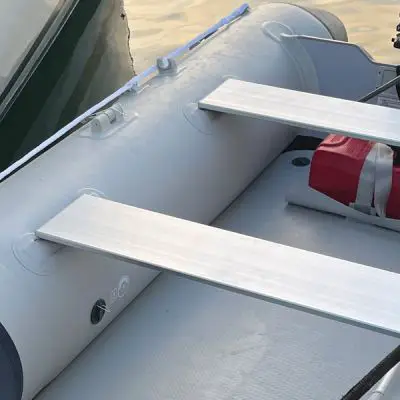
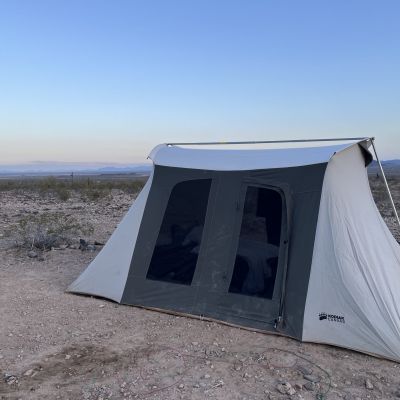
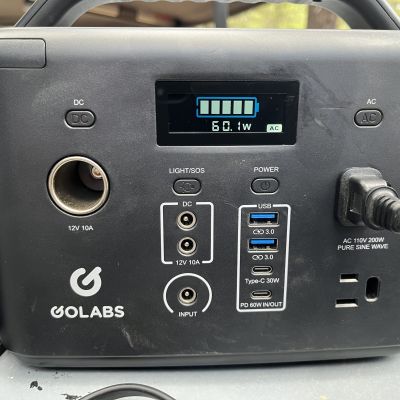
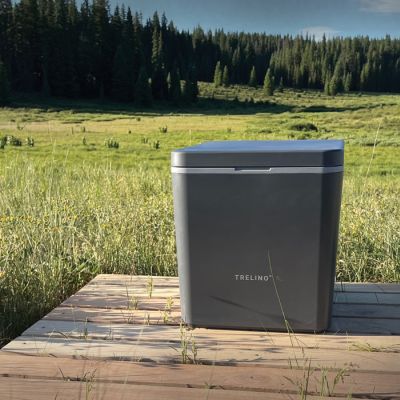
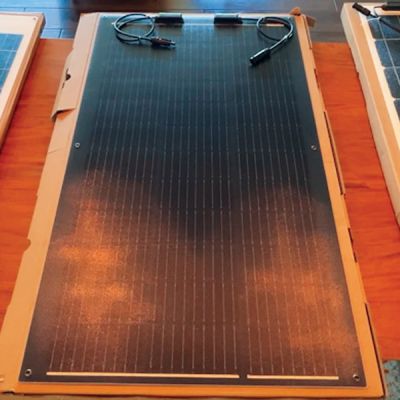
Leave a Reply